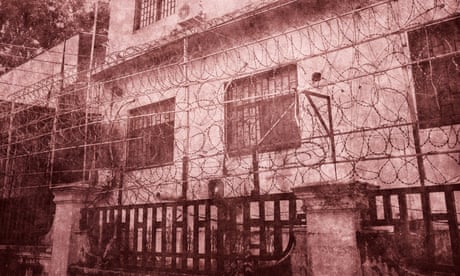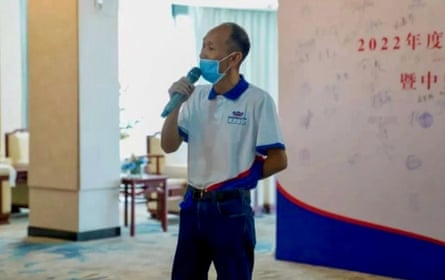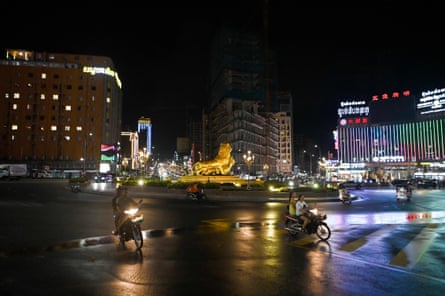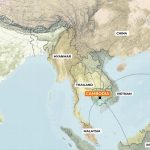Cambodia’s modern slavery nightmare: the human trafficking crisis overlooked by authorities
Op-Ed: The Guardians
Despite promises by government to eradicate trafficking rings, people are still being sold in Cambodia and forced to run online scams

Lindsey Kennedy, Nathan Paul Southern and Huang Yan, Wed 2 Nov 2022 23.59 GMT
Sihanoukville, Cambodia, and made his way to the second floor, where his friend, another victim of trafficking, was waiting. The two had hatched a desperate plan to escape the modern slavery nightmare they’d been in since Xu was sold to an online scam company in the same building three months earlier, believing a well-paid data entry job awaited him.
They jumped from the balcony onto the first floor of the building next door, hoping to climb down to the ground and run. But Xu landed badly, injuring his spine.

“It was so painful and I couldn’t stand up. My friend ran away and left me when he saw I was injured,” he says. “The managers thought I’d die so they didn’t take me back into the building, they just stood watching and laughing at me.”
Xu crawled to a road, where a Cambodian tuk-tuk driver found him and drove him to a hospital, which then transferred him to the capital, Phnom Penh. A doctor there suggested he call Chen Baorong, the Chinese founder of a volunteer organisation dedicated to rescuing people like Xu who had been duped into travelling to Cambodia’s crime-ridden casino towns with the promise of work, only to find themselves trafficked into forced labour, scamming strangers online.
Chen came at once. But before he could help Xu find a way home to China, he was arrested.Chen’s work was said to have enraged a local governor, who was quoted by local media as saying that Chen had caused “headaches”. In a closed trial in August, Chen was sentenced to two years in jail for incitement and interference with state procedures.

Eventually, Xu found his way back to China and was reunited with his family. He is undergoing spinal surgery following the injuries he received in his escape. The compound he was sold to for $7,500, Galaxy World, has now been shut down by authorities.
“Although they might not be able to catch the big boss behind it, they were able to catch some bad people and clean up the criminal activities in the compound, so this is good news,” he says.Advertisement
Over the past 18 months casinos, dormitory blocks, luxury hotels and remote office complexes across Cambodia and the wider region – many linked to powerful political figures – have become host to criminal operations running crypto, investment, and gaming scams. People from all over the world are lured by the promise of work, then forced to defraud strangers with threats of beatings, torture, and electrocution should they not comply. Initial calls for help triggered a handful of rescues, but as time went on, Cambodian authorities began dismissing reports of trafficking and detention as labour disputes.
The World Justice Project ranks Cambodia among the worst in the world for rule of law. Analysts say that highlighting the trafficking crisis both embarrasses the government and threatens to disrupt income streams for corrupt officials. According to survivors and family members, detainees who contact authorities often disappear or face reprisals, while some who escape and go to the police are returned to their captors. Xu, who was smuggled overland from China into Vietnam and then into Cambodia through the borderland casino town of Bavet, says Cambodian police on motorbikes picked him up from the border.

“The main obstacle is that many of the Chinese that run human trafficking and scam rings in Cambodia have a lot of influence,” says Ekapop Lueangprasert, a Bangkok volunteer whose network rescues and repatriates Thai victims. “If the local Cambodian authorities hear anything about a raid from their Thai counterparts, they inform the gangs, who move the victims and confiscate their phones. Sometimes when there are raids, the rescuers find the location empty.”
The Cambodian government has acknowledged the problem, vowing to eradicate trafficking rings by the end of October. The crackdown follows mounting pressure from local media, embassies and charities. The US Treasury’s downgrade of Cambodia to “Tier 3” – the lowest rating – in its 2022 Trafficking in Persons report, put the country at risk of sanctions and reduced foreign assistance. A five-day-long raid on one business park housing illegal online gambling sites seized nearly 10,000 phones and computers, a cache of handcuffs, guns, and tasers, and led to 495 arrests.
The ones that are ringed with barbed wire fences and CCTV cameras are so clearly prisons to hold human trafficking victims
But no charges have been brought against high-level figures. Cambodian police claim several notorious sites were already abandoned or showed no evidence of crime. Meanwhile, it’s unclear whether people removed from trafficking compounds have just been moved elsewhere. On 24 October, VOD English reported that some Thai and Taiwanese victims had been transported overland to Laos and Myanmar, where large-scale scam sites are a major problem. Others may have been relocated inside Cambodia.
“The Cambodian government feels like they gain very little from these [trafficking] activities… so they will either crack down or move these gangs into more legitimate casinos where they can collect taxes and revenue from them,” says Ekapop.
While the new policy is an improvement, he says parts of Cambodia’s border are littered with compounds yet to be shut down. “You can tell by looking at the buildings. The ones that are ringed with barbed wire fences and CCTV cameras are so clearly prisons to hold human trafficking victims … I think if the Cambodian government was serious about cracking down on human trafficking it wouldn’t be too hard.”
Attempts by the authors reach out to Cambodian police and government spokespeople went unanswered.
… as you’re joining us today from Canada, we have a small favour to ask. Tens of millions have placed their trust in the Guardian’s fearless journalism since we started publishing 200 years ago, turning to us in moments of crisis, uncertainty, solidarity and hope. More than 1.5 million supporters, from 180 countries, now power us financially – keeping us open to all, and fiercely independent.
Unlike many others, the Guardian has no shareholders and no billionaire owner. Just the determination and passion to deliver high-impact global reporting, always free from commercial or political influence. Reporting like this is vital for democracy, for fairness and to demand better from the powerful.
And we provide all this for free, for everyone to read. We do this because we believe in information equality. Greater numbers of people can keep track of the events shaping our world, understand their impact on people and communities, and become inspired to take meaningful action. Millions can benefit from open access to quality, truthful news, regardless of their ability to pay for it.

